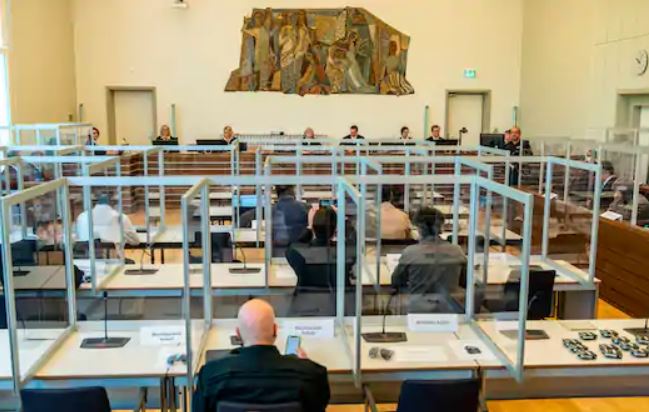German aid worker sues Syria’s intelligence services over claims of torture
BERLIN, Germany (North Press) – German citizen Martin Lautwein filed a lawsuit in German courts against the Syrian Military Intelligence for practicing torture against him on Tuesday, after he was detained in Syria. Lautwein decided to testify two years after his release due to what he had encountered in one of the “torture prisons” in Damascus.
Aid worker Lautwein said only his German passport and Czech diplomatic intervention freed him from Syrian intelligence service brutality in 2018, enabling him and an Australian friend to return home.
Lautwein was arrested in 2018 in the city of Qamishli, in northeastern Syria, after providing technical and humanitarian aid. He was thrown into a Syrian intelligence prison for 48 days of hunger and violence, and freed only thanks to diplomatic efforts, according to a report by the German website Deutsche Welle (DW).
“Now, I want to use my privilege to make people in Germany aware of what happens every day in Syria,” Lautwein said in remarks published by the European Center for Constitutional and Human Rights (ECCHR) in Berlin on Tuesday.
Germany’s federal prosecutions office in Karlsruhe said Lautwein’s case has been the subject of investigations over the past two years.
The ECCHR said Lautwein had become joint plaintiff to charges filed in 2017 with German federal prosecutors by 13 “torture survivors” from Syria, directed at high-ranking functionaries in Syria’s military intelligence services.
Related investigations led last April to the start of a trial in the German city of Koblenz— the first-ever worldwide trial on state torture in Syria, enabled by a German law enacted in 2002 allowing German courts to investigate international crimes in certain circumstances.
The Suddeutsche Zeitung website, citing Lautwein, stated that he was tortured, and that he also witnessed horrific practices against prisoners, including murder and rape.
Lautwein, accused by Syria’s regime of spying, possibly because he had contacts with Kurds while delivering what he described as medical aid, said he too was tortured. Over 48 days he had felt like an “animal.” The ECCHR also quoted Lautwein as saying: “I hope that my German court testimony will help bring crimes against human rights to justice.”
Patrick Crocker, of the ECCHR, announced that Lautwein could provide information on torture, sexual violence and inhumane living conditions in detention centers, and that his case is proof of the terrible circumstances that were taking place in 2018 and “may still continue today.”
The Syrian intelligence accused Lautwein of spying for foreign parties because “he may have had relations with the Kurds,” according to media reports.
Lautwein said that he was only able to return to his country because he holds a German passport, and “now I want to take advantage of this privilege to inform people here in Germany of what is happening in Syria on a daily basis.”
Lautwein, along with an Australian, was arrested in the Kurdish-majority Syrian city of Qamishli and brought to Military Intelligence Branch 235 in Damascus, one of dozens of notorious facilities run by Syrian Intelligence, according to information he gave to the public prosecutor.
Because he was not blindfolded, said the ECCHR, Lautwein was later able to give detailed testimony on how others were tortured, raped, and killed, citing him as saying: “the [Syrian regime’s] aim was to break people with all means possible.”
Forty-eight days later, due to mediation by the Czech Republic as the only EU nation still with an embassy in Syria, the two friends were released.
The European Center for Constitutional and Human Rights said that other cases must be opened to fulfill the right to one of the most difficult periods of Syrian history.

